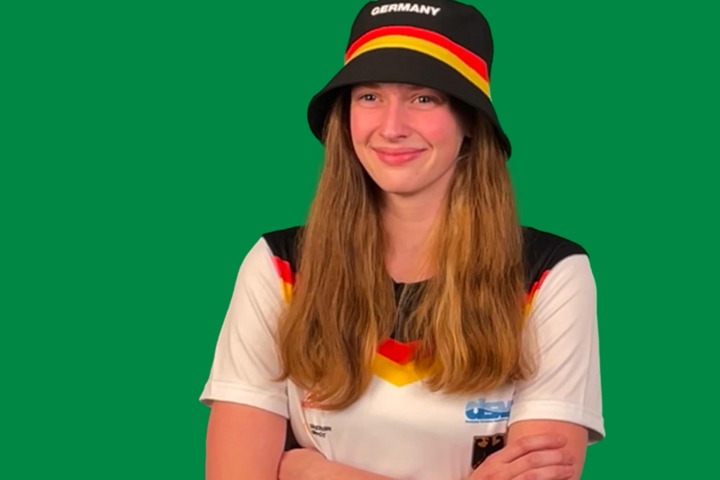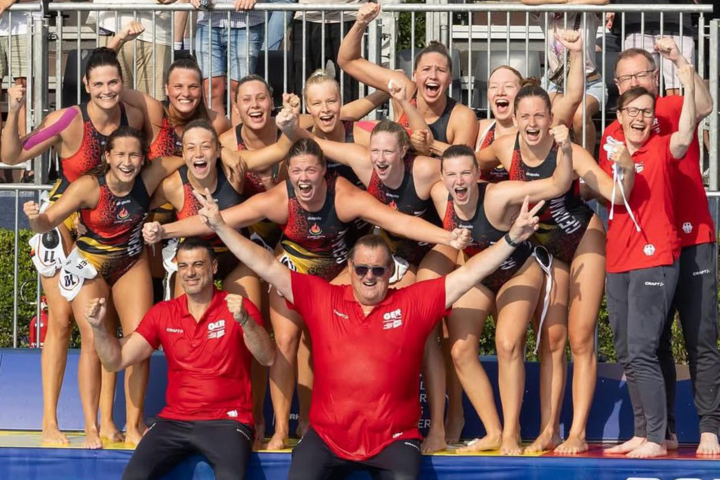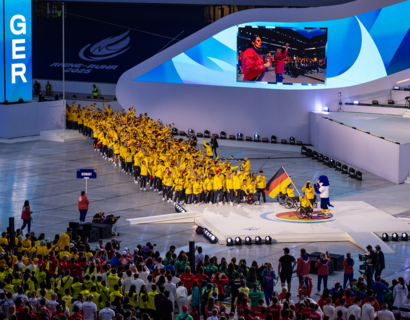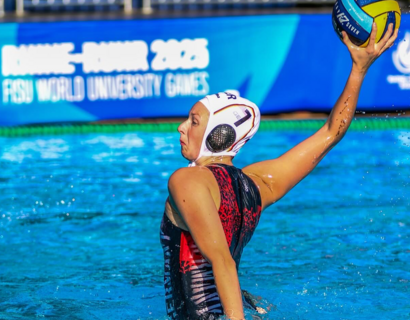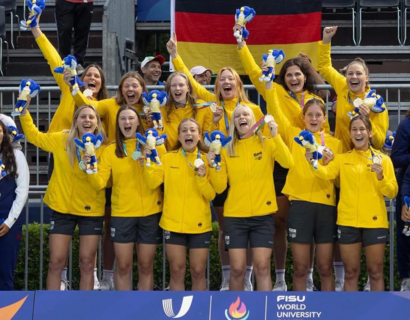„Für mich ist es ein Etappenziel auf dem Weg zu Olympia“
Es war ein historischer Sieg für die deutschen Wasserballerinnen: Bei den diesjährigen FISU Games – dem „Olympia der Studierenden“ – holten sie erstmalig Gold. Mit dabei: TH-Studentin und Nachwuchsnationalspielerin Anne Rieck. Im Interview erzählt sie, wie sie vom Seepferdchen direkt zum Wasserballtraining kam und wie sie Leistungssport und Logistikstudium unter einen Hut bringt – mit Olympia 2028 fest im Blick. +++ English version below +++
Anne, du hast mit den Wasserballfrauen Gold bei den FISU Games geholt - herzlichen Glückwunsch! Was ist das für ein Wettkampf und wie bist du darauf gekommen, dich anzumelden?
Die FISU World University Games Summer 2025 sind das „Olympia für Studenten“, früher als Universade bekannt. Für viele Spitzensportler waren diese Spiele ein wichtiger Meilenstein in der Sportlerkarriere. Durch den Deutschen Schwimmverband erfuhren wir, dass Wasserball von Deutschland dieses Mal dabei ist, da Deutschland Ausrichter war. Die Kriterien, dass man Student sein muss und maximal 25 Jahre alt, habe ich erfüllt. Ich habe mich beworben, da es ein internationaler Wettkampf ist und man sich messen kann. Zudem stehen die FISU Games für eine junge, moderne und große Veranstaltung mit Festivalatmosphäre.
Wie ist die Konkurrenz? Für einen ersten Platz spielt ihr sicher auf hohem Niveau? Betreibst du Wasserball auf Leistungssportniveau?
Die Konkurrenz bei solchen Wettbewerben kann man schlecht einschätzen, da es keine vergleichbaren Wettkämpfe in dieser Altersklasse gibt und man die Mannschaften nicht kennt. Natürlich kennt man die europäischen Nationen von Europameisterschaften der Frauen, aber dennoch sagen die Mannschaften nichts über die Studentenmannschaften der Länder aus. Bei den FISU World University Games Summer 2025 waren acht Nationen für den Frauen-Wasserball vertreten.
Wir haben viel für diesen ersten Platz trainiert und auch geopfert. Mit „geopfert“ meine ich: Freizeit, Familie, Urlaub, Kultur etc. Auch ist Leistungssport mit Höhen und Tiefen auf körperlicher und psychischer Ebene verbunden. Verletzungen, Schmerzen, Tränen gehören auch mal dazu. Ich betreibe Wasserball als Leistungssport. Meine Leistungssportkarriere hat in Chemnitz 2018 angefangen. Dort habe ich die Sportschule besucht und mein Abitur gemacht. Seit drei Jahren spiele ich professionell für die Wasserfreunde Spandau 04 in Berlin in der 1. Bundesliga und auch international, wie Championsleague, Euroleague und Danubeleague. Des Weiteren bin ich seit 2019 in der Nachwuchsnationalmannschaft und seit 2022 spiele ich in der A-Frauennationalmannschaft für Deutschland.
Wie setzt sich dann so ein Uni-Team zusammen? Trainiert da jeder für sich in seinem „Heimatverein“ oder bereitet ihr euch gemeinsam vor?
Nach zwei Bewerbungsphasen und diversen Sichtungslehrgängen wurden die Sportler für die Teilnahme nominiert. Unser TEAM-Studi bestand aus 12 Spielerinnen, zwei Trainern und einer Physiotherapeutin. Viele Spielerinnen spielen in der deutschen Bundesliga, aber wir haben auch Spielerinnen, die zurzeit in den USA und den Niederlanden studieren und dort spielen. Die meiste Zeit des Jahres trainiert jede einzelne Spielerin in ihrem Heimatverein. Vor solchen Wettkämpfen finden mehrere Trainingsmaßnahmen statt. Für die FISU World University Games Summer 2025 haben wir insgesamt 16 Tage zusammen in Hannover trainiert. Die 16 Tage Vorbereitung fanden nicht am Stück statt. Zwischen durch waren wir zuhause und haben uns regeneriert und leichte Trainingseinheiten selbstständig absolviert.
Wie lief die Qualifikation ab?
Da Deutschland Ausrichter war, hat der ADH auch die Frauen Wasserballerinnen berufen. Die anderen Nationen konnten sich anmelden. Wie genau der Prozess ist, weiß ich leider nicht. Die Qualifikation als Spielerin erfolgte durch das Bewerbungsverfahren und die Sichtungslehrgänge. Denn es wurden am Anfang 20 Spielerinnen zum Lehrgang eingeladen. Wir hatten drei Lehrgänge zusammen, wo am Ende immer der Trainer entscheiden musste, wer nicht mehr für den nächsten Lehrgang nominiert ist oder zum Schluss für den Wettkampf.
Was studierst du - und wie lässt sich das Training mit deinem Stundenplan vereinbaren?
Ich studiere an der TH Wildau Logistik im 5. Semester. Mein Training lässt sich nur schlecht mit dem Stundenplan vereinbaren, da ich jeden Morgen und Abend Training habe. Ich habe mich unteranderem für die TH Wildau entschieden, da mein Wunsch-Studiengang Logistik angeboten wurde und es keine Anwesenheitspflicht gibt, wie zum Beispiel beim Dualen Studium. Mein tägliches Training, die Wettkämpfe und das Studium unter einen Hut zu bekommen, bedarf Disziplin, Fleiß und Ehrgeiz. Es ist sehr schwierig und klappt nicht immer so gut. Aber das ist nicht alles. Bedauerlicherweise haben sich meine Wettkämpfe auf internationaler Ebene verschoben, so dass ich Module bzw. Prüfungen schon schieben musste. Auch mein Praxissemester konnte ich noch nicht machen.
Wie bist du zum Wasserball gekommen - was ist faszinierend daran?
Zum Wasserball bin ich durch den Schwimmunterricht in der dritten Klasse der Grundschule gekommen. Dort gab es in der letzten Stunde das Angebot, Wasserball auszuprobieren. Danach habe ich bei dem damaligen OSC Potsdam heutigen Orcas Potsdam einen Probetrainingsmonat absolviert. Seitdem bin ich dabeigeblieben. Mich faszinierte an dem Sport das Element Wasser, dass es ein Mannschaftssport ist, der Teamgeist, die Schnelligkeit des Spiels und die verschiedenen Spieltaktiken.
Kann das jede*r? Kommt man eher vom Schwimmen oder eher vom Handball zum Wasserball? Oder ist das ganz anders?
Wer schwimmen kann, kann mit Wasserball anfangen. In der Regel kommt man vom Schwimmen, aber bei mir war das anders. Ich hatte vorher in meinem Leben noch nie eine Schwimmstunde außer beim Ablegen des Seepferdchens und beim Schulschwimmen. Ich spielte damals Fußball im Verein. Viele Sportler kommen zum Wasserball auch durch ihre Familie oder die Nationalität. Denn Wasserball in Deutschland ist eigentlich eine Randsportart. In anderen Nationen, wie zum Beispiel Ungarn und Kroatien ist Wasserball die Volkssportart wie bei uns Fußball.
Wenn man Gold geholt hat, ist man da schon am Ende der Ziele oder sind die FISU Games so etwas wie ein Testlauf für einen anderen Wettkampf auf den du hinarbeitest?
Dieses Gold ist ein historisches Gold für die deutschen Wasserballfrauen. Das gab es noch nie. Ich war dabei und bin sehr stolz. Wir haben es als Team geschafft! Bei mir persönlich war es ein Etappenziel auf meinem langen Weg zu den olympischen Spielen. Wir als deutsche Frauennationalmannschaft haben das Ziel an den Olympischen Spielen 2028 in Los Angeles teilzunehmen. Bis dahin ist es aber noch ein weiter und harter Weg. Das höchste Ziel eines Leistungssportlers ist die Teilnahme an Olympia!
In English: ‘For me, it's a milestone on the road to the Olympics.’Bereich öffnenBereich schließen
‘For me, it's a milestone on the road to the Olympics.’
It was a historic victory for the German women's water polo team: at this year's FISU Games – the ‘Olympics for students’ – they won gold for the first time. Among them was TH student and junior national player Anne Rieck. In this interview, she talks about how she went straight from learning to swim to water polo training and how she balances competitive sport with her logistics studies – with her sights firmly set on the 2028 Olympics.
Anne, you won gold with the women's water polo team at the FISU Games – congratulations! What kind of competition is it and how did you decide to sign up?
The FISU World University Games Summer 2025 are the ‘Olympics for students’, formerly known as the Universiade. For many top athletes, these games were an important milestone in their sporting careers. We learned from the German Swimming Association that water polo from Germany would be included this time, as Germany was the host country. I met the criteria of being a student and being no older than 25. I applied because it is an international competition and you can measure yourself against others. In addition, the FISU Games are a young, modern and large event with a festival atmosphere.
How strong is the competition? To take first place, you must be playing at a high level? Do you play water polo at a competitive level?
It's difficult to assess the competition in such competitions because there are no comparable competitions in this age group and you don't know the teams. Of course, you know the European nations from the European Women's Championships, but the teams don't say anything about the student teams of the countries. Eight nations were represented in women's water polo at the FISU World University Games Summer 2025.
We trained hard and made many sacrifices to achieve this first place. By ‘sacrifices’ I mean: free time, family, holidays, culture, etc. Competitive sport also involves physical and mental highs and lows. Injuries, pain and tears are sometimes part of it.
I play water polo as a competitive sport. My competitive sports career began in Chemnitz in 2018. I attended the sports school there and completed my A-levels. For three years, I have been playing professionally for Wasserfreunde Spandau 04 in Berlin in the 1st Bundesliga and also internationally, such as in the Champions League, Euroleague and Danubeleague. Furthermore, I have been in the junior national team since 2019 and have been playing in the senior women's national team for Germany since 2022.
How is a university team put together? Does everyone train individually at their ‘home club’ or do you prepare together?
After two application phases and various trial courses, the athletes were nominated to participate. Our TEAM-Studi consisted of 12 players, two coaches and a physiotherapist. Many players play in the German Bundesliga, but we also have players who are currently studying and playing in the USA and the Netherlands. Most of the year, each player trains at her home club. Several training sessions take place before such competitions. For the FISU World University Games Summer 2025, we trained together in Hanover for a total of 16 days. The 16 days of preparation did not take place all at once. In between, we were at home, recovering and doing light training sessions on our own.
How did the qualification process work?
As Germany was the host country, the ADH also selected the women's water polo team. The other nations were able to register. Unfortunately, I don't know exactly how the process works. Qualification as a player was based on the application process and the selection trials. At the beginning, 20 players were invited to the training camp. We had three training camps together, at the end of which the coach always had to decide who would not be nominated for the next training camp or, ultimately, for the competition.
What are you studying – and how do you balance training with your study schedule?
I am in my fifth semester studying logistics at the Technical University of Applied Sciences in Wildau. My training is difficult to reconcile with my timetable, as I have training every morning and evening. One of the reasons I chose the Technical University of Applied Sciences in Wildau was because it offered my desired degree programme in logistics and there is no compulsory attendance, as is the case with dual study programmes, for example. Juggling my daily training, competitions and studies requires discipline, diligence and ambition. It's very difficult and doesn't always work out so well. But that's not all. Unfortunately, my competitions at international level have been postponed, so I've had to reschedule modules and exams. I haven't been able to do my practical semester yet either.
How did you get into water polo – what is so fascinating about it?
I got into water polo through swimming lessons in the third grade of primary school. In the last lesson, we were offered the chance to try water polo. After that, I did a month's trial training with OSC Potsdam, now Orcas Potsdam. I've been doing it ever since. What fascinated me about the sport was the element of water, the fact that it is a team sport, the team spirit, the speed of the game and the different playing tactics.
Can anyone do it? Do you tend to come to water polo from swimming or handball? Or is it completely different?
Anyone who can swim can start playing water polo. Usually, people come from swimming, but in my case it was different. I had never had a swimming lesson in my life except for the Seepferdchen swimming certificate and school swimming lessons. I used to play football in a club. Many athletes come to water polo through their family or nationality. Water polo is actually a marginal sport in Germany. In other countries, such as Hungary and Croatia, water polo is a national sport, just like football is here.
When you've won gold, have you reached the end of your goals, or are the FISU Games something of a test run for another competition you're working towards?
This gold is a historic gold for the German women's water polo team. It's never happened before. I was there and I'm very proud. We did it as a team! For me personally, it was a milestone on my long journey to the Olympic Games. We, the German women's national team, have set ourselves the goal of participating in the 2028 Olympic Games in Los Angeles. But there is still a long and hard road ahead of us. The highest goal for a competitive athlete is to participate in the Olympics!
Fachliche Ansprechperson
Dipl.-Sportwissenschaft Arne Sippel
Hochschulsport
Leiter Hochschulsport
Tel.: +49 3375 508 111
Mail: arne.sippel@th-wildau.de
Web: http://www.th-wildau.de/hochschulsport
Haus 13, Raum 157
Redaktionelle Ansprechperson
Bettina Rehmann
Zentrum für Hochschulkommunikation
Interne/Externe Kommunikation
Tel.: +49 3375 508 354
Mail: bettina.rehmann@th-wildau.de
Web: http:www.th-wildau.de/interne-kommunikation
Haus 21, Raum A102

